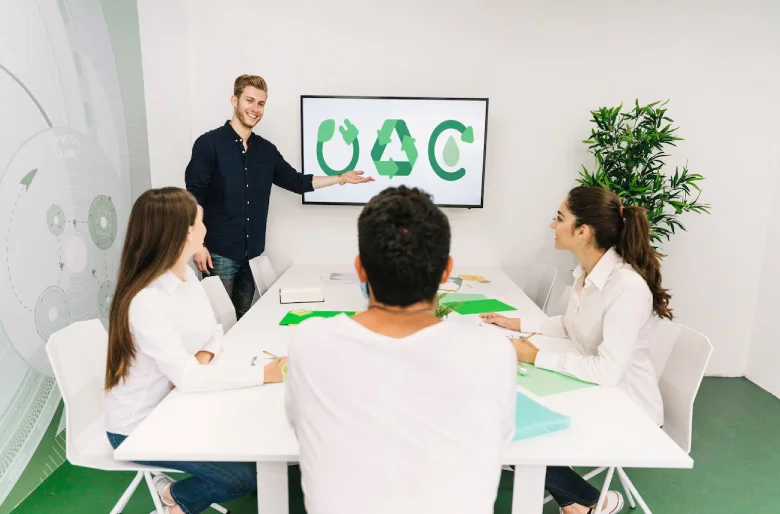The global recycling industry is set to top $667 billion by 2027. With more people focused on sustainability, recycling businesses offer a smart way to help the planet and make money. From reducing landfill waste to reusing valuable materials, Recycling businesses aren’t just popular—they’re essential today.
Recycling is changing fast, as more people care about the planet, technological advancements, and fluctuating commodity prices. Whether you’re starting fresh or growing your recycling business, now is the perfect time to tap into this thriving sector and help protect the planet.
With the right plan, you can earn a steady income and help the environment.
Why Start One?
A recycling business helps reduce waste diversion from landfills, promotes a circular economy, and can be profitable. More people want recycled products, so it’s a great time for entrepreneurs to jump in.
Government policies and public-private partnerships are offering incentives for businesses to adopt sustainable recycling models. As the world moves toward greener solutions, a recycling startup can make good money while making a real impact on the environment. Also, the increasing cost of raw materials is prompting businesses to seek cheaper, sustainable alternatives, making recycling an even more attractive investment.
Can You Make Money?

Yes, recycling is highly profitable, especially with strategic planning. Many recyclable materials, such as metals, plastics, and electronics, hold significant value. Increased awareness about sustainability and government incentives make the industry profitable and good for the planet.
In addition, the rise of eco-conscious consumers has created a strong market for businesses offering recycled and upcycled products. From fashion to furniture, industries are leveraging recycled materials to create new, sustainable products. If you get in now, you can grow with this fast-changing market.
What’s New in Recycling?
The industry is advancing with new technologies and policies. Chemical recycling is gaining traction, breaking down plastics into molecular components to create virgin-quality materials. This process helps address the issue of hard-to-recycle plastics and provides a new avenue for sustainable manufacturing.
More companies now design products to be reused, recycled, and last longer. Companies are designing products with end-of-life recycling in mind, ensuring materials can be reused multiple times without quality degradation. The e-waste recycling sector is expanding due to the increasing number of discarded electronic devices, which contain valuable metals like gold, silver, and palladium.
Community-based programs such as drop-off centers and curbside collection are driving participation. Meanwhile, businesses are emphasizing sustainability and transparency, ensuring responsible material sourcing and clear communication about recycling efforts. People want to see where their waste goes and how it’s reused.
How Big Is the Market?
According to the Global Recycling Market Report, the industry is projected to reach $667.3 billion by 2027, with a 6.5% annual growth rate. Factors such as rising commodity prices, waste reduction initiatives, and government regulations are fueling this growth.
What Pays the Most?
Among the most profitable recyclable materials, metals like aluminum, copper, and gold from e-waste lead due to their high resale value. Scrap metal recycling, including steel and brass, remains in demand across industries. Recycling plastic and paper can bring steady profits, especially in large volumes. Additionally, e-waste recycling is lucrative, as discarded electronics contain valuable metals and components that can be refurbished or repurposed.
Other profitable recycling businesses include construction waste recycling, where materials such as concrete, wood, and metal can be repurposed for new building projects. Food waste recycling is also gaining traction, converting organic waste into biogas, compost, and fertilizers.
Great Recycling Business Ideas
There are various profitable recycling business opportunities to explore:
- Plastic Recycling: Transforming waste plastics like bottles and packaging into reusable products.
- Paper Recycling: Reducing deforestation by repurposing discarded newspapers, magazines, and office paper.
- Glass Recycling: Collecting and processing discarded glass containers for reuse.
- Metal Recycling: Processing materials like aluminum, steel, copper, and brass for resale.
- E-Waste Recycling: Recovering valuable metals from discarded electronics.
- Textile Recycling: Repurposing old clothing and fabric scraps into new materials.
- Battery Recycling: Recover metals from old batteries to make new ones.
How to Get Started

Steps to Start
- Market Research: Analyze demand, competitors, and feasibility.
- Business Planning: Outline strategies, financial projections, and operational processes.
- Legal Compliance: Obtain necessary licenses, permits, and certifications.
- Funding Options: Secure loans, grants, or investor funding.
- Facility and Equipment Setup: Establish a recycling center with appropriate machinery.
- Marketing Strategies: Promote your recycling startup through digital platforms, networking, and community engagement.
- Operational Efficiency: Make recycling faster and more efficient by improving how you collect, sort, and process materials.
What It Costs to Start
The cost to start a recycling business varies based on the type of materials being processed and the scale of operations. Below is a detailed breakdown:
| Business Type | Estimated Cost Range | Key Expenses Covered |
|---|---|---|
| Small-Scale Operation | $10,000 – $50,000 | Basic equipment, permits, and initial labor costs |
| Mid-Sized Facility | $50,000 – $150,000 | Advanced sorting equipment, facility rental, and transport |
| Large-Scale Plant | $100,000 – $500,000+ | High-tech machinery, storage, logistics, licensing |
| Specialized Recycling (e-waste, batteries, textiles) | $150,000 – $1,000,000 | Advanced processing technologies, safety protocols, and hazardous waste management |
Grants and loans can help offset these costs, making it easier for businesses to invest in the necessary equipment and infrastructure.
Governments and organizations are prioritizing circular economy initiatives, encouraging businesses to create closed-loop systems where materials are continuously reused.
New recycling niches are popping up, like fashion waste and old solar panels. Urban mining, which extracts valuable materials from discarded products, is gaining traction. Furthermore, AI-driven sorting systems are improving efficiency, making it easier to recycle a broader range of materials.
Conclusion
Starting a recycling business is both profitable and impactful. By adopting innovative models, circular economy strategies, and smart recycling technologies, entrepreneurs can build successful ventures while making a lasting environmental difference.
Businesses that stay ahead of trends and commit to sustainable practices will thrive in the long run. Whether you start with plastic, metal, or e-waste recycling, there is a vast market waiting to be tapped. If you start now, you can build a profitable business and help protect the planet for the future.